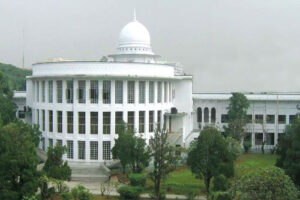The Appellate Division is the appellate side of the Supreme Court of Bangladesh and the highest court of Bangladesh like the Supreme Court of UK, India and Pakistan.
The jurisdiction of the Supreme Court of Bangladesh has been provided for in the Constitution of the People’s Republic of Bangladesh. Article 94(1) of the Constitution provides that there shall be Supreme Court for Bangladesh comprising the Appellate Division and the High Court Division. These two Divisions of the Supreme Court have separate jurisdictions. The sources of this jurisdiction, apart from the Constitution, are general laws (Acts of Parliament) of the country.
Jurisdiction of the Appellate Division The Constitution has conferred on the Appellate Division the following jurisdictions:
a. Appellate Jurisdiction: Article 103 of the Constitution provides that the Appellate Division shall have jurisdiction to hear and determine appeals from judgments, decrees, orders or sentences of the High Court Division. An appeal to the Appellate Division shall lie as of right where the High Court Division- (a) certifies that the case involves a substantial question of law as to the interpretation of the Constitution; or (b) has sentenced or confirmed the sentence of a person to death or to imprisonment for life; or (c) has imposed punishment on a person for contempt of that division; and in other cases if the Appellate Division grants leave to appeal and also pursuant to Acts of Parliament.
b. Issue and execution of processes of Appellate Division: Under article 104, the Appellate Division shall have power to issue such directions, orders, decrees or writs as may be necessary for doing complete justice in any cause or matter pending before it, including orders for the purpose of securing the attendance of any person or the discovery or production of any document.
c. Power of Review: Article 105 provides that the Appellate Division shall have power, subject to the provisions of any Act of Parliament and of any rules made by the Division, to review any judgment pronounced or any order made by it. Part IV, Order XXVI of the Supreme Court of Bangladesh (Appellate Division) Rules, 1988 deals with the power and procedural matters of review of the Appellate Division.
d. Advisory Jurisdiction: Article 106 of the Constitution provides that if at any time it appears to the President that question of law has arisen, or is likely to arise, which is of such a nature and of such public importance that it is expedient to obtain the opinion of the Supreme Court upon it, he may refer the question to the Appellate Division for consideration and the Division may, after such hearing as it thinks fit, report its opinion thereon to the President.
e. Rule making power of the Supreme Court: Subject to any law made by Parliament, the Supreme Court may with the approval of the President, make rules for regulating the practice and procedure of each Division of the Supreme Court and of any Court subordinate to it.
Bench of the Appellate Division:
As per the Supreme Court of Bangladesh (Appellate Division) Rules, 1988, every cause, appeal or matter is heard and disposed of by a Bench, consisting of not less than three judges nominated by the Chief Justice, but which judgments and orders or decrees passed by a single judge in the High Court Division, those matters can be heard and disposed by a bench, consisting of not less than three judges nominated by the Chief Justice. In case of judgments and orders or decrees passed by a single Bench in the High Court Division, those matters can be heard and disposed of by a bench, consisting of two judges nominated by the Chief Justice, but those matters may be referred to the larger bench by the Chief Justice if he thinks so. If during hearing any matter the judges are divided equally, the matter may also refer to the Larger Bench. Besides to hear and dispose of the applications, the Chief Justice appoints a Judge in Chamber. The judge in chamber is one the Honourable judges of the Appellate Division. Every case must have to be brought before the Honourable judge in chamber and after perusing the merit of the case the Honourable judge in chamber may refer to the full bench of the Appellate Division.

